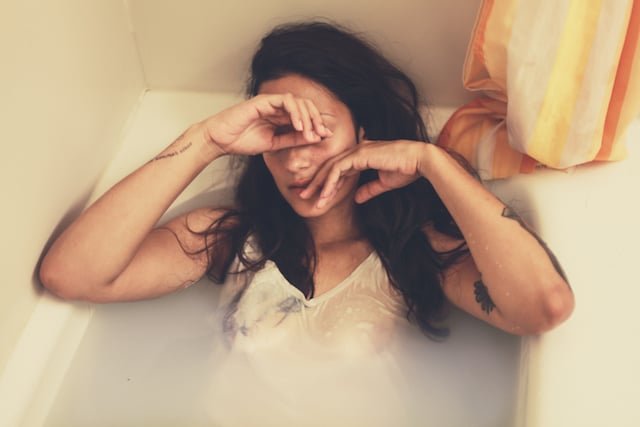*Warning: spoilers ahead!
I binge-watched Netflix’s new series, “13 Reasons Why,” in fewer than 24 hours this week.
It left me feeling mixed emotions for many different reasons, the main one being that I related so much with the high school experience of Hannah Baker.
I’ve written at length about the kind of sexual assault and sexual harassment that I, and other girls, experienced in high school and college. In some ways, I almost feel like the show didn’t do it justice because, until the very end, it made it appear as though it was isolated and targeted only a few people. It’s not. It’s all of us. And the effects are real.
“13 Reasons Why” attempted to show the duality of these kinds of situations, that nothing is black and white, and that there are many sides to every story—each with their own reasons and motivations. That was real, and it was honest.
It begged the question, “Did you do enough to help this person?” That’s something that all of us who’ve been touched by suicide have asked ourselves at one point or another. I remember feeling that guilt and asking myself the same question after I found out that a guy I had dated briefly in college—Sean—chose to end his life a few years later.
I found myself asking that question even though we hadn’t really kept in touch, and had only spoken once or twice in the previous three years. Even though we weren’t even that close—even though I knew those things—I still found myself combing over our last conversation in my mind wondering if I’d missed a sign that something was wrong.
There’s another emotion that occurs after a suicide—a conflicting one—that often creeps in: Anger. We feel angry at the person because we see the devastation left behind. I remember Sean’s funeral, seeing his sister and his parents there and how utterly torn apart they were. I thought, “How could you do this to them?” At the time, it seemed selfish.
During the last episode of “13 Reasons Why,” when Hannah’s parents find her in the bath tub, I couldn’t help but think about Sean’s parents and what it must have been like for them to find his body—and I cried. Hard. Harder than I’ve ever cried watching any movie or anything on TV in my entire life.
The show also depicted the difficulty of the situation as it relates to Hannah’s mental state—the way she rarely asked for help, and in many cases pushed people away, even though on the inside, she was screaming for someone to help her. I’ve been on that side of suicide, too, being the person who knows that this person is in trouble and trying as hard as I can to help them, but also knowing that ultimately, there’s nothing more I can do because it’s her choice.
That’s the hardest part. I’ve been the person who practically forced myself into the house of a withdrawn, suicidal friend. I’ve been the person who is frantically sending text messages to someone who posted a goodbye note on social media with no response. I’ve been the person taking on the entire responsibility for someone else’s well-being—and it’s too much. It’s too much to make yourself solely responsible for another person’s choice of whether they live or die. All you can do is listen. And I suppose my situation is unique, I doubt most people find themselves crossing paths with more than one person in that mental state in such a short span of a few years.
“13 Reason’s Why” also addresses bystander apathy, where people are less likely to offer a victim help when there are other people around. I’ve seen that in action, too.
When I was 16, I was at a New Year’s Eve party at the house of a much older guy (named Kyle) from my hometown. He was in his 20’s, and he was dating a girl my age from the next town over (this sort of thing happened frequently, I grew up in a very small, rural town). We were all sitting in the living room of Kyle’s house on New Year’s Eve. Several of his friends were there—guys his age—along with us, and everyone was drinking. He was drunk. Too drunk.
I remember four of us sitting at a table playing a card game; myself, an older guy (Jay), and the couple in question. I don’t remember what was said or how it happened, all I remember is Kyle getting completely belligerent, standing up, reaching across the table, and slapping his 16-year-old girlfriend across the face.
The room went silent, and no one did anything. I was a 16-year-old girl, too, and a socially awkward, extremely introverted one at that. I was in shock and I didn’t know what to say or do. I wasn’t really friends with Kyle; he was livid and, quite frankly, it was scary, I didn’t think there was much I could do. I remember looking across the table at Jay—the one person in the room who was Kyle’s equal, the person who was the same age, who did know him—and waiting for him to do something. To say something. But he just sat there and looked down at the table, like everyone else.
Later that night, a group of us girls took Kyle’s girlfriend back to one of our parents house and hid her in the basement while he called incessantly, demanding that we give her up. I guess, in the end, we did protect her, as best we could. For the night, anyway.
As I’m writing this, there’s a psychologist on the Today Show saying that this show should be pulled off the air immediately because it glamorizes suicide, and shows that there is no help if you ask for it. He believes that it will make more teens want to attempt suicide.
I don’t think it glamorizes suicide at all. Whether or not it will make teens want to attempt it—I don’t know. But what I do know is that it’s not directed at suicidal teens. It’s directed at the people who stand by and do nothing—because so many times, especially when it comes to women and sexual assault, we do ask for help and no help is given. It’s meant to show people the consequences of their apathy, and begs them to do something about it.
If you haven’t watched “13 Reasons Why” yet, I recommend that you do. It’s real and it’s uncomfortable. I hope that it spurs the appropriate amount of reflection on this very real problem. I don’t know what the answer is; I don’t know that there is an answer—at least not a simple one.
It’s a complex problem and it requires a complex, multi-faceted solution, but the beginning of solving it is becoming aware of all of the aspects of it, becoming more sensitive to it, and working toward solutions collectively in small ways.
~
~
~
Author: Ashley Riley
Image: Naomi August/Unsplash
Editor: Taia Butler











Read 1 comment and reply